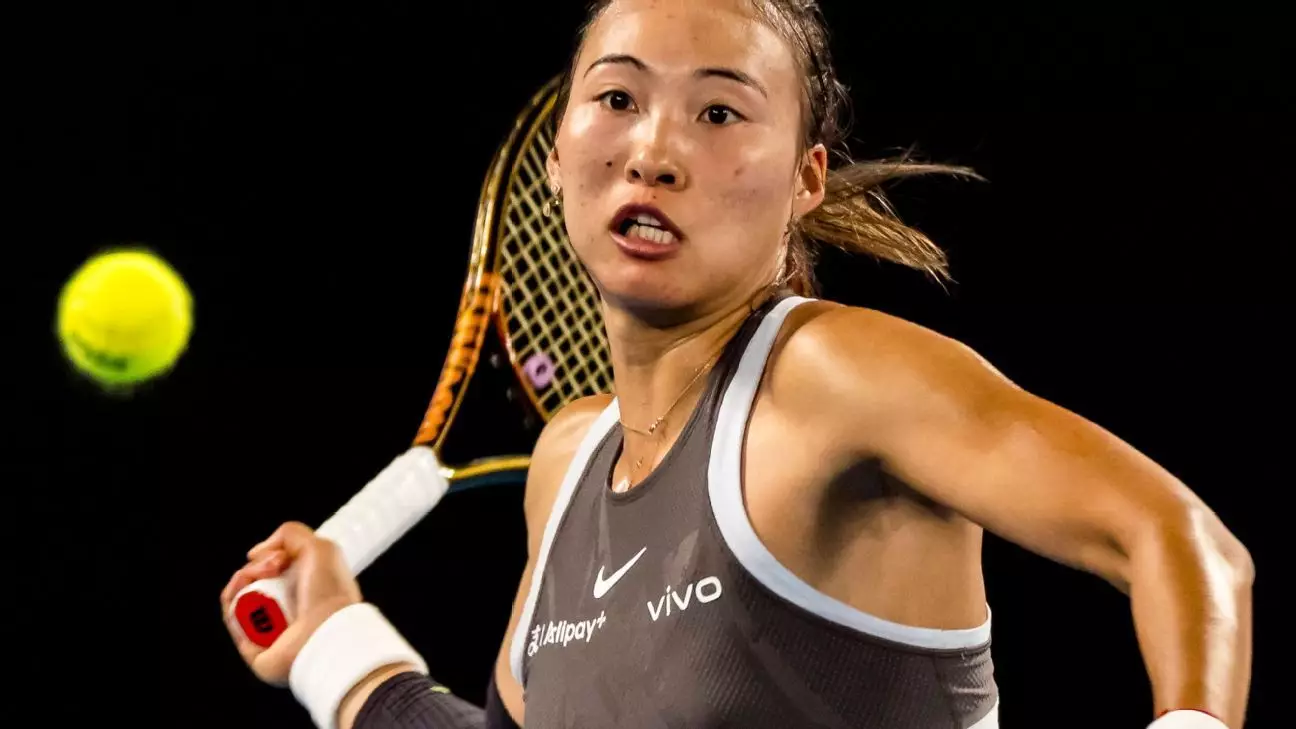Tennis player Zheng Qinwen stepped onto the court at Melbourne Park, a venue familiar to her, yet her emotions betrayed the notable transformations that had occurred over the past year. Just twelve months prior, Zheng made a remarkable run to the finals of the Australian Open, a journey that etched her name among the tennis elite. This year, amidst the anticipation and pressure, she faced the first round of the tournament with a blend of nerves and excitement. Despite these jitters, encapsulated in her own words—“Actually, I feel really nervous”—she emerged victorious, defeating Romanian qualifier Anca Todoni with a decisive scoreline of 7-6 (3), 6-1.
The pressure of performing well on such a grand stage, after achieving accolades that include a gold medal win in the Paris Olympic Games, certainly weighed heavily on the young athlete’s shoulders. It’s an intriguing anomaly in sport—the greater the achievements, the more anxiety can accompany future performances. Zheng’s emotional connection to the Australian Open was palpable, showing how athletic success often comes hand in hand with psychological pressures.
The match between Zheng and Todoni provided a compelling display of contrasts. While Zheng’s game is driven by power and aggression, Todoni’s strategy relied on caution and finesse. In the evolving climate of professional tennis, Zheng’s fierce style aligns well with the sport’s current trends; her big-hitting prowess is tailor-made for the hard court surfaces, particularly benefitting from the indoor conditions present during this match.
To enter a tournament under challenging weather and emotional duress is no small feat. The match began amidst a furious storm, reflecting the turbulence within Zheng as she faced critical moments, including set points that she struggled to capitalize on when serving. Despite these hurdles, Zheng tightened her focus at crucial junctures, confirming that even in suboptimal conditions, her competitive instinct remains sharp.
Zheng’s admission regarding nerves introduces a vital aspect of athletic competition: the psychological battle. She mentioned that nerves generally enhance her focus, yet this particular instance didn’t play in her favor. This inconsistency suggests an illuminating truth about the psychological mechanics of sports; nerves can be a double-edged sword.
As her match progressed, Zheng seemed to settle, finding her rhythm in the second set with a confident and commanding performance. The ease with which she dispatched Todoni after a shaky start underscores the notion that while nerves may derail performance initially, they can also propel an athlete to elevate their game once they find their footing.
The Australian Open represents more than just a title; for many players, including Zheng, it symbolizes opportunity and renewal. The tournament kicked off this year under a new format that extends its duration, permitting athletes more time to ease into their matches without overwhelming schedules. For someone like Zheng, who is both a rising star and a previous finalist, the flexibility offered by a 15-day tournament provides valuable breathing room.
Moreover, Zheng’s progress holds significance not only for her career but also for her nation. As one of the leading figures in Chinese tennis, her victories resonate beyond the court, signaling the potential and prowess of Chinese athletes in global sports. As the season unfolds, her performance here serves as a benchmark—setting the tone for her future endeavors.
Reflecting on Competition: The Broad Spectrum of Outcomes
As the tournament continues, it quickly becomes evident that the dynamics of tennis extend far beyond simple wins and losses. Lesser-known players like Hady Habib, who made history by becoming the first man from Lebanon to win a match at the Grand Slam level, embody the spirit of opportunity that permeates the event. Habib’s success against a Chinese competitor not only illuminates the competitive landscape but also highlights the collective dream of athletes vying for recognition on an international platform.
In a sport where the margins of victory are often minuscule, the stories of triumph emerge as crucial elements of the narrative. Each match carries the weight of personal aspirations, of dreams realized or dashed, and ultimately, of the legacies each player hopes to leave behind.
The Outlook Ahead
As Zheng continues her journey in this year’s Australian Open, one cannot help but ponder the trajectory of her career. With a robust mental game, increased experience, and refined skills, she is positioned not just to contend but to dominate the hard courts. As we observe her path, the anticipation surrounding her matches only heightens, with the eyes of fans and pundits alike focused on what this year will bring—both for her and for the tennis world at large.

